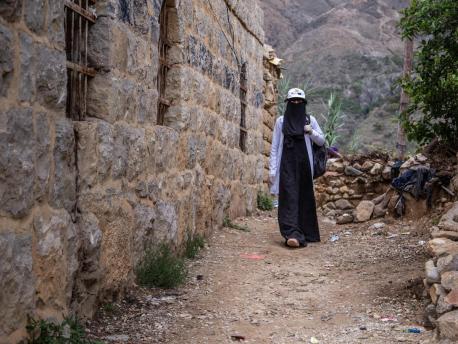
Protecting Yemen's Children From COVID-19
The whole world is grappling with the threat of COVID-19, but in places where safe water, sanitation and health care are in short supply, the risks are exponentially greater. Even before the coronavirus hit, war-torn Yemen was already facing the world's worst humanitarian crisis. Five years of violence and instability have left families struggling to survive. The country's health care system is in a state of collapse. The economy is in free fall. Food and water systems are barely functional. Handwashing, the simplest of interventions, is impossible without reliable access to safe water and soap — rare commodities for millions of Yemenis.
UNICEF teams are working nonstop to shore up water and sanitation systems in Yemen, one of the most water-scarce countries in the world
Yemen is one of the most water-scarce countries in the world, and the civil war has further restricted access to safe water. Since the fighting escalated in 2015, UNICEF and partners have worked to rehabilitate damaged water, sanitation and hygiene (WASH) systems. Today, UNICEF reaches almost 9 million people in Yemen with vitally needed WASH services. "UNICEF is striving to prevent a complete collapse of water and sanitation systems in Yemen," says Maysoun Alhajomar, a UNICEF Yemen WASH specialist.
Now an urgent funding crisis looms. Without adequate resources, 6 million people will soon be deprived of the water they need to stay alive.
UNICEF-supported community health workers like 23-year-old Saba Muhammad Essa (top photo) spend their days traveling rugged roads on foot to reach families cut off from lifesaving medical services by the ongoing fighting. She teaches proper handwashing and hygiene techniques, and conducts malnutrition screenings and referrals. "We are now in quarantine because of the coronavirus," she says. "The war has affected our society by the siege, nonpayment of salaries, increase of the number of widows and orphans and the increase of [people] displaced by the war from their houses and cities."
UNICEF-supported community health workers go door-to-door raising awareness on how to prevent the spread of COVID-19 — a real challenge in Yemen, where 70% of households lack access to soap and water
Hanniah Alhmadi, a UNICEF YEMEN volunteer, goes door-to-door sharing information on COVID-19, urging people to wash their hands, avoid handshaking and stay away from crowded places. "My strong love of volunteering is what made me go out, and my love for my country, my family, my neighbors and my relatives," she says. "What motivates me to raise awareness against COVID-19 is the seriousness of the disease and the speed of its spread."
UNICEF has been working around the clock to push back COVID-19, supporting health facilities, delivering supplies, shoring up emergency services— all while continuing to meet the essential needs of children. Vaccinations must continue to prevent disease outbreaks; malnourished children must receive treatment to stay alive.
"In one day, a child in Yemen will face injustice and hardship on a scale that most people will never experience in a lifetime," says UNICEF Representative in Yemen Sara Beysolow Nyanti.
"COVID-19 is a crisis in nearly every country, but very few counties face a more terrifying impact than Yemen," says UNICEF Executive Director Henrietta Fore. "And as always, it is children who suffer first and suffer most."
As of June 2020, UNICEF's $479 million appeal to sustain basic essential services for children in Yemen is only 38 percent funded. Urgent support is needed to keep UNICEF's essential programs up and running. Your generous contribution will help UNICEF continue to save lives and protect the most vulnerable in Yemen.
Top photo: 23-year-old Saba Muhammad Essa, a UNICEF-supported community health worker, travels on foot to reach families cut off from health services by fighting in Bait Essa, Amran governate, Yemen. © UNICEF/UNI339518/Gabreez
HOW TO HELP
There are many ways to make a difference
War, famine, poverty, natural disasters — threats to the world's children keep coming. But UNICEF won't stop working to keep children healthy and safe.
UNICEF works in over 190 countries and territories — more places than any other children's organization. UNICEF has the world's largest humanitarian warehouse and, when disaster strikes, can get supplies almost anywhere within 72 hours. Constantly innovating, always advocating for a better world for children, UNICEF works to ensure that every child can grow up healthy, educated, protected and respected.
Would you like to help give all children the opportunity to reach their full potential? There are many ways to get involved.





